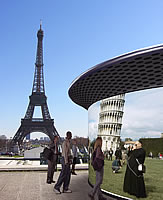Making the world a smaller place
An Austrian company is set to revolutionise communication between Europe's citizens with the launch of a large round screen which allows one-to-one, real time, oral and visual communication with someone in another country. Tholos, named after a type of circular ancient Greek temple, comprises a screen nearly three metres by seven metres. Future installations will link up 16 European cities by 2008, while the first two cities to participate will be London and Vienna, in early 2004. 'It's a new form of communication that will link up citizens across the world,' Suzanna Collis, a spokesperson for the project, told CORDIS News. 'People will be able to interact normally, as if they were standing next to each other.' The idea was first conceived by Austrian cameraman Andreas Traint when he was working in the film industry. Over six years, Tholos Systems, the company set up to make the idea a reality, has developed four different prototypes. The final model comprises directional microphones and loud speakers, as well as five cameras and projectors and a patented technology derived from cinema technology. Images are projected onto a spinning slotted drum inside the structure, and the cameras and drum are synchronised so that pictures are captured at intervals each time a slot passes in front of a camera lens. As the drum spins, the projected images produce a seamless wrap-around picture. Simultaneously, people standing at any point around the Tholos can be filmed through the screen. While the schedule is yet to be finalised, one of the next cities to host a Tholos will be Paris. Other cities on the list, all of which have a population of over one million, include Copenhagen, Budapest and Warsaw. The network will then be linked with cities in America and Asia. It is estimated that each Tholos will cost around two million euro to build and install. Running costs will be covered by advertising, which will take up 13 per cent of air time, leaving access free for the public. Initially, live link-ins with specific cities will be scheduled and advertised in advance. Individuals will later be able to book the Tholos for a link-in with any participating city. While the Tholos is initially envisaged as a tourist attraction, it is also expected to have educational and corporate applications. Discussions have already begun on using the technology in university hospitals. Doctors at one Tholos would be able to walk around the screen, viewing a patient from all angles. Such a tool also has obvious interest for the business community, particularly in the field of marketing. Interest has already been expressed in the initiative, and Tholos Systems has plans to build a smaller, mobile unit, in order to meet this demand. Ms Collis told CORDIS News that the company has had discussions on Tholos with representatives from the European Commission, and remains in regular contact with MEPs from the UK, France, Germany and Austria.
Countries
Austria, United Kingdom



